【英语】英语语法一般将来时归纳总结
- 格式:doc
- 大小:62.00 KB
- 文档页数:8
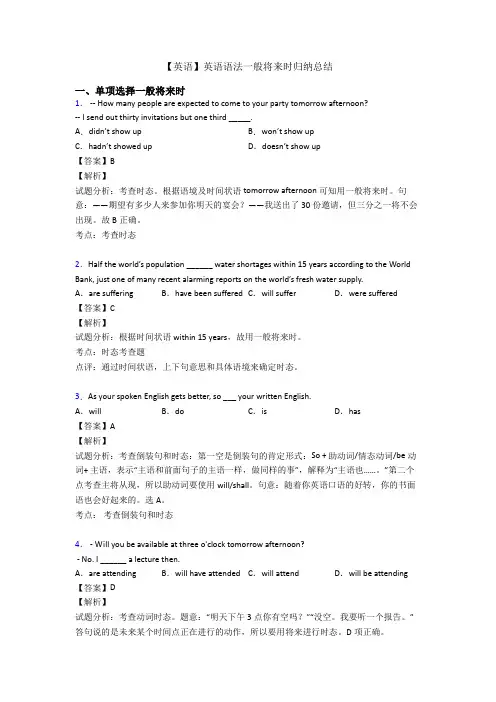
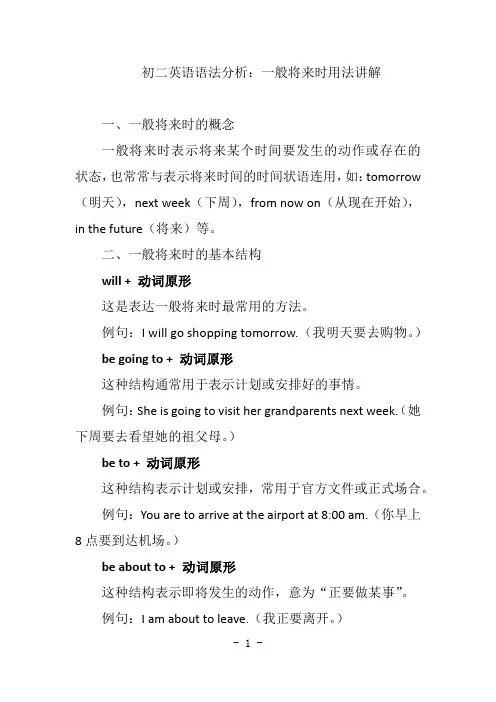
初二英语语法分析:一般将来时用法讲解一、一般将来时的概念一般将来时表示将来某个时间要发生的动作或存在的状态,也常常与表示将来时间的时间状语连用,如:tomorrow (明天),next week(下周),from now on(从现在开始),in the future(将来)等。
二、一般将来时的基本结构will + 动词原形这是表达一般将来时最常用的方法。
例句:I will go shopping tomorrow.(我明天要去购物。
)be going to + 动词原形这种结构通常用于表示计划或安排好的事情。
例句:She is going to visit her grandparents next week.(她下周要去看望她的祖父母。
)be to + 动词原形这种结构表示计划或安排,常用于官方文件或正式场合。
例句:You are to arrive at the airport at 8:00 am.(你早上8点要到达机场。
)be about to + 动词原形这种结构表示即将发生的动作,意为“正要做某事”。
例句:I am about to leave.(我正要离开。
)be due to + 动词原形这种结构表示某事预定或预期将要发生。
例句:The train is due to arrive at 5:00 pm.(火车预定下午5点到达。
)三、一般将来时的用法1表示将来的动作或状态例句:I will buy a new car next year.(明年我要买一辆新车。
)2表示将来的计划或安排例句:We are going to have a picnic this weekend.(我们这个周末要去野餐。
)3表示根据现有情况推测未来的可能性例句:It's going to rain soon.(很快就要下雨了。
)4表示命令、请求、建议等例句:You are to finish your homework before you go out.(你出去之前要把作业做完。
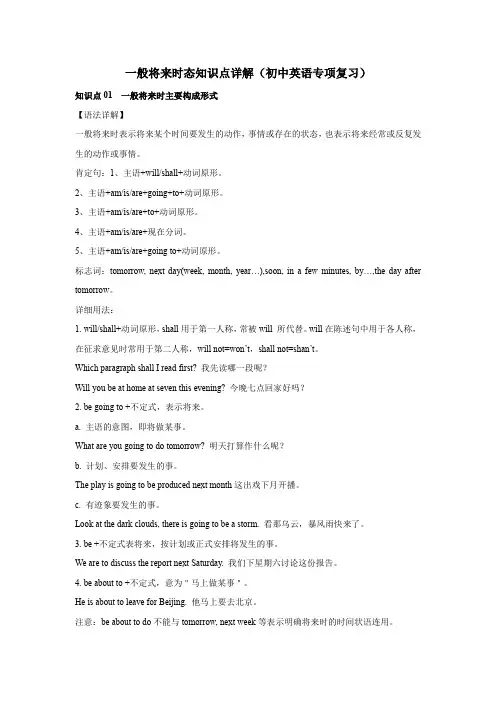
一般将来时态知识点详解(初中英语专项复习)知识点01 一般将来时主要构成形式【语法详解】一般将来时表示将来某个时间要发生的动作,事情或存在的状态,也表示将来经常或反复发生的动作或事情。
肯定句:1、主语+will/shall+动词原形。
2、主语+am/is/are+going+to+动词原形。
3、主语+am/is/are+to+动词原形。
4、主语+am/is/are+现在分词。
5、主语+am/is/are+going to+动词原形。
标志词:tomorrow, next day(week, month, year…),soon, in a few minutes, by…,the day after tomorrow。
详细用法:1. will/shall+动词原形,shall用于第一人称,常被will 所代替。
will在陈述句中用于各人称,在征求意见时常用于第二人称,will not=won’t,shall not=shan’t。
Which paragraph shall I read first? 我先读哪一段呢?Will you be at home at seven this evening? 今晚七点回家好吗?2. be going to +不定式,表示将来。
a. 主语的意图,即将做某事。
What are you going to do tomorrow? 明天打算作什么呢?b. 计划、安排要发生的事。
The play is going to be produced next month这出戏下月开播。
c. 有迹象要发生的事。
Look at the dark clouds, there is going to be a storm. 看那乌云,暴风雨快来了。
3. be +不定式表将来,按计划或正式安排将发生的事。
We are to discuss the report next Saturday. 我们下星期六讨论这份报告。
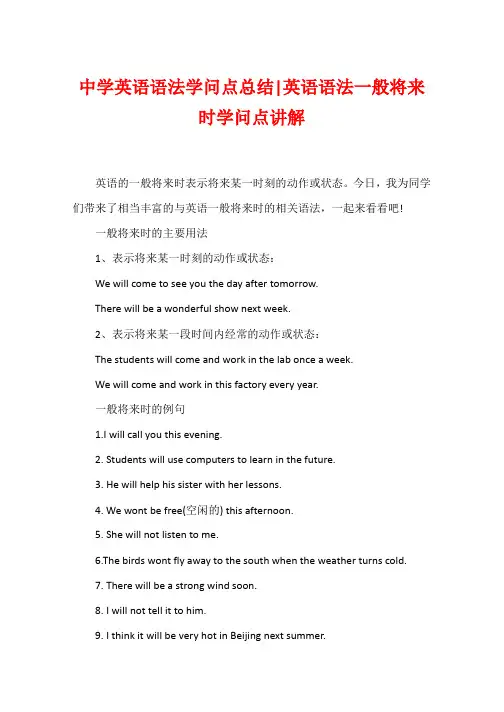
中学英语语法学问点总结|英语语法一般将来时学问点讲解英语的一般将来时表示将来某一时刻的动作或状态。
今日,我为同学们带来了相当丰富的与英语一般将来时的相关语法,一起来看看吧!一般将来时的主要用法1、表示将来某一时刻的动作或状态:We will come to see you the day after tomorrow.There will be a wonderful show next week.2、表示将来某一段时间内经常的动作或状态:The students will come and work in the lab once a week.We will come and work in this factory every year.一般将来时的例句1.I will call you this evening.2. Students will use computers to learn in the future.3. He will help his sister with her lessons.4. We wont be free(空闲的) this afternoon.5. She will not listen to me.6.The birds wont fly away to the south when the weather turns cold.7. There will be a strong wind soon.8. I will not tell it to him.9. I think it will be very hot in Beijing next summer.10.He will use his pen and his computer.11. Will there be heavy rain tomorrow?一般将来时的各种句式我们除了用be going to+动词原形可以表示一般将来时外,我们还可以用will+动词原形来表示一般将来时.will 引导的一般将来时:表示将来发生的动作或存在的状态,最基本的结构:will + 动词原形主谓(宾)句型的一般将来时:确定句:主语+ will +动词原形+(宾语)+其他Some day people will go to the moon .否定句:在will 的后面加not即可。
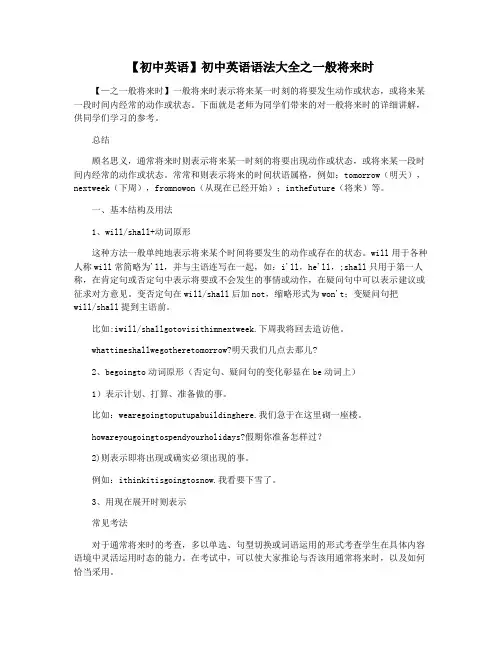
【初中英语】初中英语语法大全之一般将来时【—之一般将来时】一般将来时表示将来某一时刻的将要发生动作或状态,或将来某一段时间内经常的动作或状态。
下面就是老师为同学们带来的对一般将来时的详细讲解,供同学们学习的参考。
总结顾名思义,通常将来时则表示将来某一时刻的将要出现动作或状态,或将来某一段时间内经常的动作或状态。
常常和则表示将来的时间状语属格,例如:tomorrow(明天),nextweek(下周),fromnowon(从现在已经开始);inthefuture(将来)等。
一、基本结构及用法1、will/shall+动词原形这种方法一般单纯地表示将来某个时间将要发生的动作或存在的状态。
will用于各种人称will常简略为'll,并与主语连写在一起,如:i'll,he'll,;shall只用于第一人称,在肯定句或否定句中表示将要或不会发生的事情或动作,在疑问句中可以表示建议或征求对方意见。
变否定句在will/shall后加not,缩略形式为won't;变疑问句把will/shall提到主语前。
比如:iwill/shallgotovisithimnextweek.下周我将回去造访他。
whattimeshallwegotheretomorrow?明天我们几点去那儿?2、begoingto动词原形(否定句、疑问句的变化彰显在be动词上)1)表示计划、打算、准备做的事。
比如:wearegoingtoputupabuildinghere.我们急于在这里砌一座楼。
howareyougoingtospendyourholidays?假期你准备怎样过?2)则表示即将出现或确实必须出现的事。
例如:ithinkitisgoingtosnow.我看要下雪了。
3、用现在展开时则表示常见考法对于通常将来时的考查,多以单选、句型切换或词语运用的形式考查学生在具体内容语境中灵活运用时态的能力。
在考试中,可以使大家推论与否该用通常将来时,以及如何恰当采用。
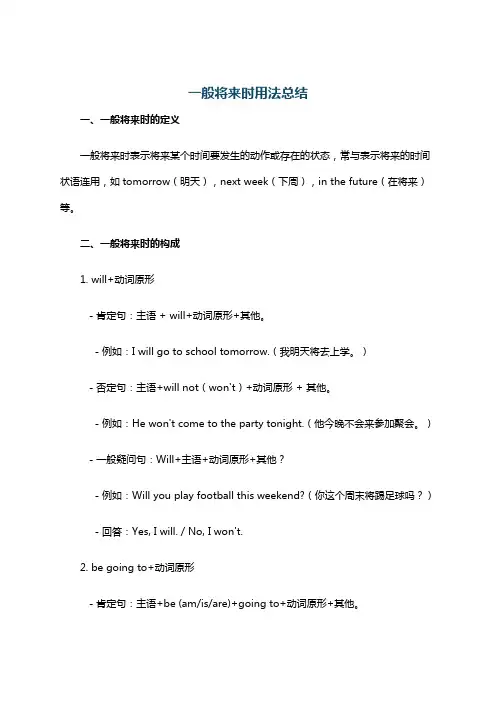
一般将来时用法总结一、一般将来时的定义一般将来时表示将来某个时间要发生的动作或存在的状态,常与表示将来的时间状语连用,如tomorrow(明天),next week(下周),in the future(在将来)等。
二、一般将来时的构成1. will+动词原形- 肯定句:主语 + will+动词原形+其他。
- 例如:I will go to school tomorrow.(我明天将去上学。
)- 否定句:主语+will not(won't)+动词原形 + 其他。
- 例如:He won't come to the party tonight.(他今晚不会来参加聚会。
) - 一般疑问句:Will+主语+动词原形+其他?- 例如:Will you play football this weekend?(你这个周末将踢足球吗?) - 回答:Yes, I will. / No, I won't.2. be going to+动词原形- 肯定句:主语+be (am/is/are)+going to+动词原形+其他。
- 例如:She is going to visit her grandparents next month.(她打算下个月去看望她的祖父母。
)- 否定句:主语+be (am/is/are)+not+going to+动词原形+其他。
- 例如:They are not going to have a meeting this afternoon.(他们今天下午不打算开会。
)- 一般疑问句:Be (am/is/are)+主语+going to+动词原形+其他?- 例如:Are you going to do your homework tonight?(你今晚打算做你的家庭作业吗?)- 回答:Yes, I am. / No, I'm not.三、一般将来时的用法1. 表示将来的计划或打算(be going to侧重于计划打算;will侧重于意愿)- I'm going to study hard this term.(我打算这个学期努力学习。
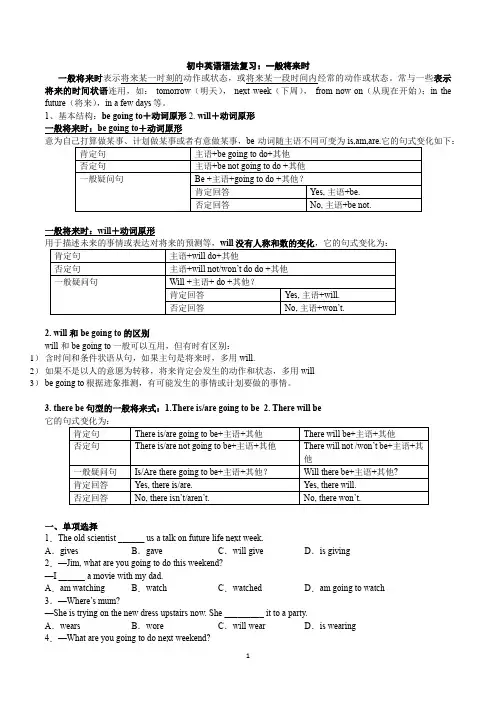
初中英语语法复习:一般将来时一般将来时表示将来某一时刻的动作或状态,或将来某一段时间内经常的动作或状态。
常与一些表示将来的时间状语连用,如:tomorrow(明天),next week(下周),from now on(从现在开始);in the future(将来),in a few days等。
1、基本结构:be going to+动词原形 2. will+动词原形一般将来时:be going to+动词原形一般将来时:will+动词原形2. will 和be going to 的区别will 和be going to一般可以互用,但有时有区别:1)含时间和条件状语从句,如果主句是将来时,多用will.2)如果不是以人的意愿为转移,将来肯定会发生的动作和状态,多用will3)be going to根据迹象推测,有可能发生的事情或计划要做的事情。
3. there be 句型的一般将来式:1.There is/are going to be 2. There will be一、单项选择1.The old scientist ______ us a talk on future life next week.A.gives B.gave C.will give D.is giving2.—Jim, what are you going to do this weekend?—I ______ a movie with my dad.A.am watching B.watch C.watched D.am going to watch3.—Where’s mum?—She is trying on the new dress upstairs now. She _________ it to a party.A.wears B.wore C.will wear D.is wearing4.—What are you going to do next weekend?—There __________ a basketball match next Sunday. I want to watch it.A.will be B.will have C.is going to have D.are going to be 5.—Which team ________ the football match?—I’m not sure. The two teams both play well. Let’s wait and see.A.wins B.won C.is winning D.will win 6.Robots ________ us do some heavy and difficult jobs in the future.A.help B.helped C.are helping D.will help7.—What are you going to do next weekend, Wang Hui?—I ________ my grandparents next Sunday.A.visit B.visitedC.am visiting D.am going to visit8.I don’t know if it ________ sunny tomorrow. If it ________ sunny, I will go fishing. A.will be; is B.is; will beC.will be; is going to be D.is; is9.We are going to have a farewell party ________.A.now B.every day C.last week D.next Friday 10.There is going to ________ a basketball match tomorrow.A.be B.have C.is D.are11.Look at the dark clouds in the sky. It ________.A.is going to rain B.rained C.raining D.rainy 12.What ________you ________for tomorrow’s party?A.did; wear B.will; wear C.do; going to wear D.do; do13.He ________ busy this week. He ________ free next week.A.is; is B.will; will be C.is; will be14.There are many black clouds in the sky. It ________ soon.A.will rain B.rains C.rained D.is raining 15.It ________ warm in Dalian tomorrow.A.will be B.is C.does16.She will ________ a book about animals after school.A.buys B.buy C.is buy D.going to buy 17.Mike ________ his room yesterday, and he is going to ________ his homework tomorrow. A.cleaned; do B.cleaned; did C.clean; do18.—Our library is bright and beautiful.—Yes. Will you ________ us ________ it?A.shows; to B.show; aroundC.shows; around D.show; to19.Look! There are a lot of clouds in the sky. It is going to _______ soon.A.rains B.rainy C.be raining D.be rainy20.Li Ming ______ a T-shirt tomorrow.A.buys B.bought C.buy D.will buy 21.Sarah and I ______ a film next Sunday. We ______ horses last Sunday.A.am going to see; rode B.are going to see; rode C.will see; ride 22.—What are you going to do this weekend?—_______A.I’m going to visit my grandparents.B.I’m fine.C.I’m watching TV.D.I’m cleaning the room.23.—Peter! What is your plan for this Sunday?—I ________ my grandmother. She is in hospital.A.visit B.am visiting C.am going to visit 24.It’s cloudy all day today, but it ________ tomorrow.A.changes B.changed C.will change D.is changing 25.—Can your sister ________?—No, she can’t. But she ________ to swim next month.A.swims; is learning B.swim; is learningC.swims; is going to learn D.swim; is going to learn26.—When ________ you come back from London, Mary?—Last week. The River Thames is really beautiful and I ________ it again.A.do; visit B.did; visit C.do; am visiting D.did; will visit 27.This is our last night in China. We ________ home tomorrow.A.will fly B.fly C.flies D.flew 28.—Schools ________ different in the future.—Yes, you are right.A.is B.are C.were D.will be 29.—Why are you in a hurry, Cindy?—There ________ a basketball match between Class One and our class at 3 o’clock.A.are going to be B.will haveC.is going to have D.will be30.Tony _________ the Great Wall with his classmates next Sunday morning.A.visited B.visits C.will visit D.visit31.There ________ a sports meeting in our school next week.A.was B.were C.are D.is going to be 32.You can borrow this film—surely you _________ watching it.A.enjoy B.enjoyed C.will enjoy D.are enjoying 33.—Why are you in such a hurry, Peter?—I________ a basketball match between Class One and our class in ten minutes.A.join in B.am joining in C.joined in D.am going to join in 34.Robots and machines people do more work in the future.A.help B.will help C.are helping D.helped 35.After this exam, you ________ a wonderful holiday next month. Take it easy!A.have B.has C.had D.will have36.If it ______ rain tomorrow, my family ______ go for a walk in the park.A.isn’t, will B.doesn’t, willC.won’t, will D.won’t be, will37.—It’s hot here.—I ________ and open the window.A.go B.went C.am going D.will go 38.—When ________ Lingling ________ litter with her friend?—Next Saturday morning.A.does; collect B.did; collect C.will; collect D.is; collecting 39.Perhaps we ________ able to connect our minds to the Internet in the future.A.are B.were C.have been D.will be 40.—What’s your plan for the new term?—I ________ English well.A.learn B.learnedC.am learning D.am going to learn41.—Are you free? I’d like you to go to the museum with me.—Sorry, there _______ some important meetings this coming weekend.A.is going to have B.will have C.are going to be D.is going to be 42.There ________ schools in the future. Students will study at home.A.is going to have B.will be C.won’t have D.won’t be 43.—How will students learn then?—They ________ by computers in the classroom.A.studies B.studied C.will study D.is studying 44.—What are you going to do, Betty?—I’m going ________ football this afternoon.A.play B.to play C.played D.playing45.We hope ________ a computer on every student’s desk in the future.A.there is B.there wasC.there will have D.there will be46.—What are you going to do this Sunday?—I ________ a picnic with my parents.A.have B.had C.am having D.am going to have 47.We hope there ________ a war in the world. Everyone can live a happy life.A.will not have B.will be not C.is not going to be D.is not going to have 48.If you interview the estate agent, he ________ you much information about housing. A.gives B.gave C.will give D.is giving 49.—The radio says it ________ rain this afternoon, isn’t it?—No. I think it will be sunny.A.will go to B.is going to C.shall go to D.will be 50.Where __________ you __________ have a meeting tomorrow?A.do; go B.will; go C.are; go D.are; going to二、完成句子51.My mother will be back in an hour. (改为否定句)My mother back in an hour.52.The students will study at home in the future. (改为一般疑问句)the students at home in the future?53.Things will be different in the future. (变为一般疑问句)things in the future?54.There is a football match at the sports hall every day.(用tomorrow改写句子)a football match at the sports hall tomorrow.55.Alice is going to do her homework this afternoon. (改为—般疑问句)Alice her homework this afternoon?56.They are going to take a walk in the park. (就划线部分提问)they to in the park?57.They will meet at the school gate at 7 a.m. on Saturday. (对画线部分提问)they at the school gate?58.I’m going to learn English well because it’s very useful.(对划线部分提问)you going to learn English well?初中英语语法复习:一般将来时答案1.C【详解】句意:下周这位老科学家将给我们做一个关于未来生活的报告。
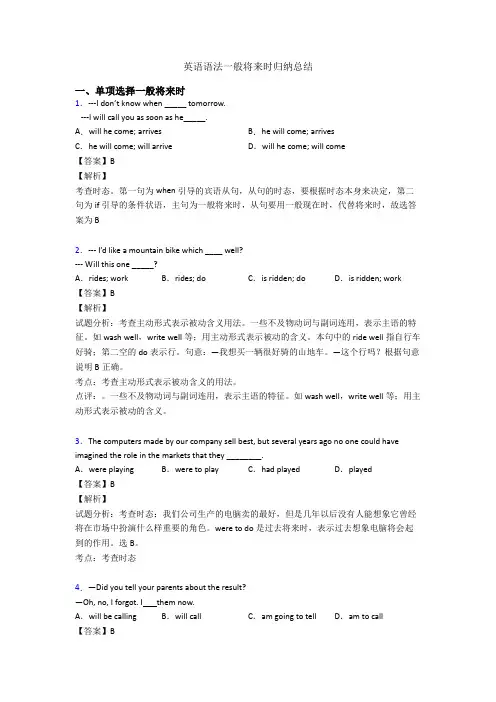
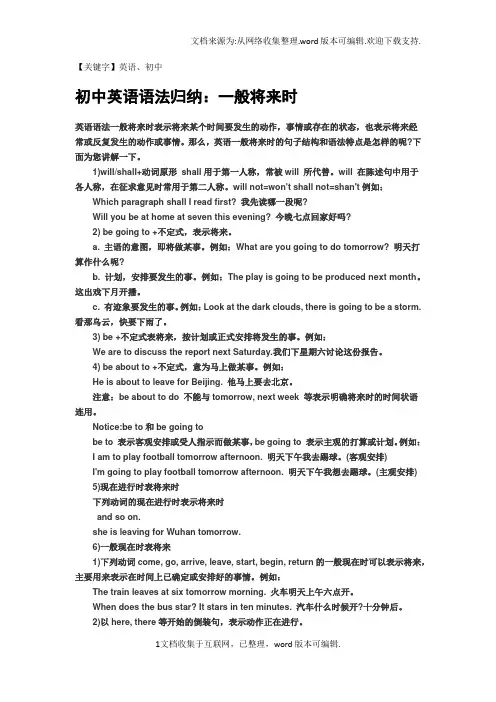
【关键字】英语、初中初中英语语法归纳:一般将来时英语语法一般将来时表示将来某个时间要发生的动作,事情或存在的状态,也表示将来经常或反复发生的动作或事情。
那么,英语一般将来时的句子结构和语法特点是怎样的呢?下面为您讲解一下。
1)will/shall+动词原形shall用于第一人称,常被will 所代替。
will 在陈述句中用于各人称,在征求意见时常用于第二人称。
will not=won't shall not=shan't例如:Which paragraph shall I read first? 我先读哪一段呢?Will you be at home at seven this evening? 今晚七点回家好吗?2) be going to +不定式,表示将来。
a. 主语的意图,即将做某事。
例如:What are you going to do tomorrow? 明天打算作什么呢?b. 计划,安排要发生的事。
例如:The play is going to be produced next month。
这出戏下月开播。
c. 有迹象要发生的事。
例如:Look at the dark clouds, there is going to be a storm. 看那乌云,快要下雨了。
3) be +不定式表将来,按计划或正式安排将发生的事。
例如:We are to discuss the report next Saturday.我们下星期六讨论这份报告。
4) be about to +不定式,意为马上做某事。
例如:He is about to leave for Beijing. 他马上要去北京。
注意:be about to do 不能与tomorrow, next week 等表示明确将来时的时间状语连用。
Notice:be to和be going tobe to 表示客观安排或受人指示而做某事,be going to 表示主观的打算或计划。
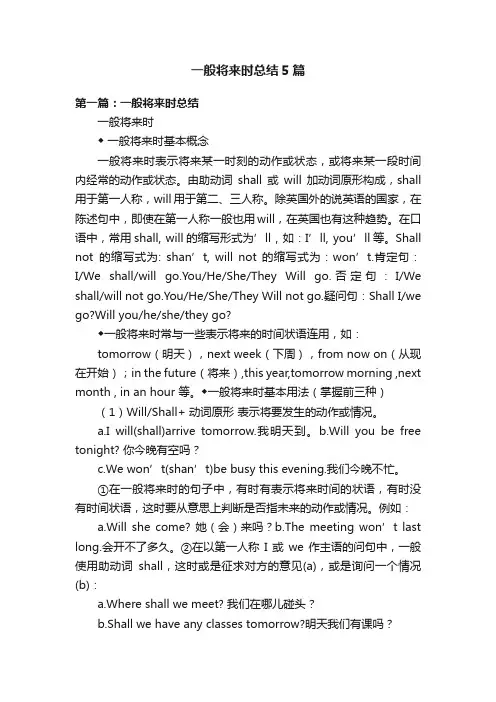
一般将来时总结5篇第一篇:一般将来时总结一般将来时◆ 一般将来时基本概念一般将来时表示将来某一时刻的动作或状态,或将来某一段时间内经常的动作或状态。
由助动词shall或will加动词原形构成,shall 用于第一人称,will用于第二、三人称。
除英国外的说英语的国家,在陈述句中,即使在第一人称一般也用will,在英国也有这种趋势。
在口语中,常用shall, will的缩写形式为’ll , 如:I’ll, you’ll等。
Shall not的缩写式为: shan’t, will not 的缩写式为:won’t.肯定句:I/We shall/will go.You/He/She/They Will go.否定句:I/We shall/will not go.You/He/She/They Will not go.疑问句:Shall I/we go?Will you/he/she/they go?◆一般将来时常与一些表示将来的时间状语连用,如:tomorrow(明天),next week(下周),from now on(从现在开始);in the future(将来),this year,tomorrow morning ,next month , in an hour 等。
◆一般将来时基本用法(掌握前三种)(1)Will/Shall+ 动词原形表示将要发生的动作或情况。
a.I will(shall)arrive tomorrow.我明天到。
b.Will you be free tonight? 你今晚有空吗?c.We won’t(shan’t)be bu sy this evening.我们今晚不忙。
①在一般将来时的句子中,有时有表示将来时间的状语,有时没有时间状语,这时要从意思上判断是否指未来的动作或情况。
例如:a.Will she come? 她(会)来吗?b.The meeting won’t last long.会开不了多久。
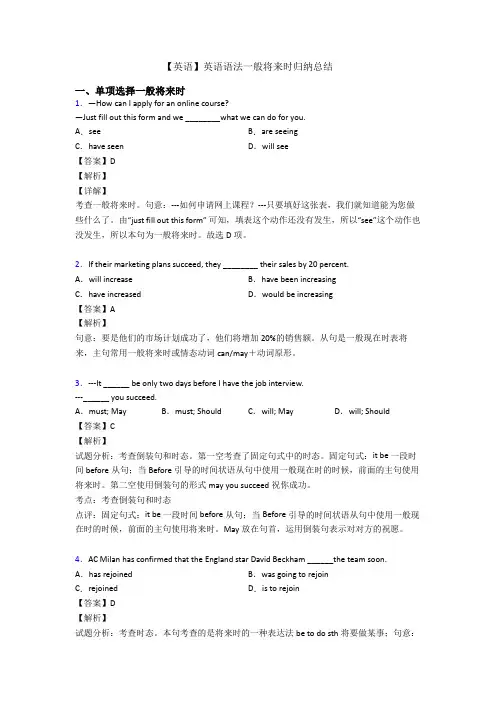
高中英语一般将来时知识点一般将来时表示将来某个时间将要发生的动作或存在的状态,亦表示将来经常或重复发生的动作,常与表示将来的时间状语连用,如:tomorrow(明天),next year(明年),soon(不久)等。
下面小编给大家分享一些高中英语一般将来时知识,希望能够帮助大家,欢迎阅读!高中英语一般将来时知识11.1 一般将来时的构成肯定句:主语 + shall/will + 动词原形...否定句:主语 + shall/will + not + 动词原形...疑问句:Shall/Will + 主语 + 动词原形...?疑问代词/疑问副词 + shall/will + 主语 + 动词原形...?1.2 一般将来时的肯定句句型:主语 + shall/will + 动词原形....在书面语中,如果主语是第一人称,常用“助动词shall + 动词原形”构成一般将来时的肯定句,即“I/we + shall + 动词原形”;shall 可缩写为'll:If I have time tomorrow,I think I'll get a haircut.如果我明天有时间,我想去理个发在口语中,所有的人称都可以用will,即“主语(所有人称) + will + 动词原形...”;will可缩写为'll:Some day,I'll tell you.将来某一天我会告诉你的。
1.3 一般将来时的否定句句型:主语 + will/shall + not + 动词原形...一般将来时的否定句是在will/shall后加not;will not可缩写为won't;shall not可缩写为shan't:Mary won't go to the party.玛丽不会去参加晚会。
1.4 一般将来时的一般疑问句句型:Shall/Will + 主语 + 动词原形...回答方式:Yes,主语 + shall/will.No,主语 + shall/will + not.一般将来时的一般疑问句是将助动词shall/will置于主语之前(大写shall/will的第一个字母),在句尾加问号;这种语序是主语和谓语倒装语序:Will he come? 他来吗?Will you be at our next meeting? 我们下次开会你来吗?Will you be free tonight? —Yes,I will./No,I won't(be free).今晚你有空吗? ——是,我有空。
一般将来时语法总结归纳一般将来时是英语语法中常用的时态之一,表示将来某个时间发生的动作或存在的状态。
本文将总结一般将来时的使用规则和相关的注意事项。
一、一般将来时的构成一般将来时由“will / shall + 动词原形”构成,其中“will”适用于所有人称,而“shall”仅适用于第一人称(I 和 we)。
例如:1. I will go shopping tomorrow.(我明天要去购物。
)2. He shall arrive at 5 p.m.(他将于下午5点到达。
)二、一般将来时的用法1. 表示自愿、决心或承诺一般将来时经常用于表示自愿、决心或承诺的动作。
例如:1. I will help you with your homework.(我愿意帮助你做作业。
)2. He will never smoke again.(他决心再也不抽烟了。
)2. 表示预测、推测或预计一般将来时可用于表达预测、推测或预计的动作或状态。
例如:1. It will rain tomorrow.(明天会下雨。
)2. They will probably win the game.(他们很可能会赢得比赛。
)3. 表示习惯或反复发生的动作一般将来时可以用来表示根据过去的行为或事件推断将来会发生的动作。
例如:1. He will often call his parents.(他通常会给父母打电话。
)2. They will always eat dinner at home.(他们总是在家吃晚餐。
)4. 表示请求、邀请或建议一般将来时也可用于表示请求、邀请或建议的动作。
例如:1. Will you please close the window?(请你关上窗户好吗?)2. Shall we meet at the café?(我们要在咖啡馆见面吗?)三、注意事项1. 否定形式将"will not"缩写为"won't",放在动词之前。
初中英语语法归纳:一般将来时之袁州冬雪创作英语语法一般将来时暗示将来某个时间要发生的动作,事情或存在的状态,也暗示将来常常或反复发生的动作或事情.那末,英语一般将来时的句子布局和语法特点是怎样的呢?下面为您讲解一下.1)will/shall+动词原形 shall用于第一人称,常被will 所代替.will 在陈述句中用于各人称,在征求意见时常常使用于第二人称.will not=won't shall not=shan't例如:Which paragraph shall I read first? 我先读哪一段呢?Will you be at home at seven this evening? 今晚七点回家好吗?2) be going to +不定式,暗示将来.a. 主语的意图,即将做某事.例如:What are you going to do tomorrow? 今天打算作什么呢?b. 计划,安插要发生的事.例如:The play is going to be produced next month.这出戏下月开播.c. 有迹象要发生的事.例如:Look at the dark clouds, there is going to be a storm. 看那乌云,将近下雨了.3) be +不定式表将来,按计划或正式安插将发生的事.例如:We are to discuss the report next Saturday.我们下星期六讨论这份陈述.4) be about to +不定式,意为顿时做某事.例如:He is about to leave for Beijing. 他顿时要去北京.注意:be about to do 不克不及与tomorrow, next week 等暗示明白将来时的时间状语连用.Notice:be to和be going tobe to 暗示客观安插或受人指示而做某事,be going to 暗示主观的打算或计划.例如:I am to play football tomorrow afternoon. 今天下午我去踢球.(客观安插)I'm going to play football tomorrow afternoon. 今天下午我想去踢球.(主观安插)5)现在停止时表将来时下列动词的现在停止时暗示将来时e.fly.leave.start.begin.finish.end.arrive and so on.she is leaving for Wuhan tomorrow.6)一般现在时表将来1)下列动词come, go, arrive, leave, start, begin, return的一般现在时可以暗示将来,主要用来暗示在时间上已确定或安插好的事情.例如:The train leaves at six tomorrow morning. 火车今天上午六点开.When does the bus star? It stars in ten minutes. 汽车什么时候开?十分钟后.2)以here, there等开端的倒装句,暗示动作正在停止.一般将来时罕见布局大比拼1. “be going to+动词原形”布局用来暗示依照主观意图打算或按计划,安插将要做的事,有“打算、就要”的意思.也常常使用于暗示从迹象上标明将要发生的事情,多指个人主观臆断的推测.如:Look at the clouds. It’s going to rain. 看这些云,要下雨了.2. “shall或will+动词原形”指对将来事物近期或远期的预见,表达个人主观意图以及征求对方意见或暗示客套的邀请.在书面语中,shall多用于第一人称;在白话中,will 可以用于任何人称.如:I shall/will show my photos to you next Monday. 我下周一给你看我的照片.句型转换1. “be going to+动词原形”布局的一般疑问句是将be的相应形式前移到句首,即“Are/Is/Am+主语+going to+动词原形+其它?”.其否定句是在be动词的相应形式后加not.如:(1)They are going to play football this afternoon.(必定句)(2)Are they going to play football this afternoon?(一般疑问句)(3)They are not going to play football this afternoon. (否定句)2. “shall/will+动词原形”布局的一般疑问句是将shall或will前移到句首,即“Shall/Will+主语+动词原形+其它?”.其否定句是在shall或will后加not.如:(1)Our teacher will come back very soon. (必定句)(2)Will our teacher come back very soon?(一般疑问句)(3)Our teacher won’t come back very soon. (否定句)一般将来时的用法一般将来时的用法(1)暗示将要发生的动作.Perhaps I shall (will) pay a visit to France this winter. 能够在本年冬天到法国观光.We shan't (won’t) be free tomorrow. 们今天没空.Will you be at home at seven this evening? 今晚七点你会在家吗?The agreement will come into force next spring. 协议将在来岁春天生效.常常使用于此类情况的时间状语有:tomorrow今天,next year来岁,from now on从现在起,in a month一个月之后,in the future将来,等.today今天,this evening今天晚上,this week这个星期,this month这个月,this year本年,等.一般将来时的用法(2)“be going to +不定式”多用于白话中,暗示打算、将要发生的事.What are you going to do tomorrow? 今天你要干什么?We are going to visit the Summer Palace next week. 下个星期我们要去观赏颐和园.Look at the dark clouds, there is going to be a storm. 看那乌云,暴风雨快来了.一般将来时的用法(3)“be +不定式”暗示安插或计划好了的动作.When are they to hand in their plan? 他们的计划什么时候交上来?The queen is to visit Japan next year. 女王将于来岁访日.一般将来时的用法(4) “be about +不定式”暗示即将发生的动作.He is about to retire. 他即将退休. The English evening is about to begin. 英语晚会即将开端.注意:be about to 一般不与时间状语连用.一般将来时的用法(5)come,go等动词用“一般现在时”暗示按规定、计划或时间表将要发生的事.He starts next week. 他下个星期出发.We leave very soon. 我们很快就分开.The train starts at 10 o'clock in the morning. 火车将在早上10点开出.这类用法限于暗示"移动"的动词:come来,go去,leave 分开,start出发,begin开端,arrive到达,depart分开,stay逗留,等.一般将来时的用法(6)come,go等动词在白话中用“现在停止时”暗示主语计划将要作的动作.They are leaving for New York tomorrow. 今天他们将要动身前往纽约.Is your brother departing soon? 你的兄弟很快就要启程吗?这类情况常与come来,go去,leave分开,start开端,begin开端,arrive到达,depart分开,stay逗留,等动词连用.所用的动词必须是动作而不是状态,主语必须是人.come,go等动词的用法比较come,go等动词用“一般现在时”暗示按规定、计划或时间表将要发生的事.(较为严格,正式;主语可以是人,也可以是交通工具、会议、戏剧或电影.) come,go等动词在白话中用“现在停止时”暗示主语计划将要作的动作.(较为宽松,主语必须是人.)The train leaves the station at 11:20. 火车将在11点20分离站.We are leaving for Boston next week. 我们将在下周前往波士顿.What time does the film begin? 电影几点开映?Is your sister staying here long? 你的姐妹在这儿会逗留很长时间吗?He starts next week. 他下周出发.She is departing soon. 她很快就要动身.will和be going to的选用原则1. 关于“打算”原先作好的打算用“be going to”.“Kate is in hospital.” “Yes, I know. I am going to see her this afternoon.”“凯特在住院.”“是的,我知道.我下午要去看她.”说话时即时的打算用“will”.“Kate is in hospital.” “Oh, really, I didn’t know. I will go and see her at once.”“凯特在住院.”“哦,是吗?我都不知道呢.我得顿时去看她.”2. 关于“预料” 在有迹象标明的情况下的预料用“be going to”Look at the clouds. It’s going to rain. 你看天上的云.快下雨了.My God! We are going to crash. 天哪!我们快撞车了.在没有迹象标明的情况下停止的猜测用“will,be going to”皆可.I think the weather will be nice.I think the weather is going to be nice. 我想天会晴朗.Do you think the car will start?Do you think the car is going to start? 你想车能发动起来吗?当动词暗示心坎活动时,暗示猜测的句子必须用“will”I think she will like the cake I made for her. 我想她会喜欢我为她做的蛋糕.常和一般将来时连用的时间状语暗示将要发生的动作.Perhaps I shall (will) pay a visit to France this winter. 我能够在本年冬天到法国观光.We shan't (won’t) be free tomorrow. 我们今天没空.Will you be at home at seven this evening? 今晚七点你会在家吗?The agreement will come into force next spring. 协议将在来岁春天生效.常常使用于此类情况的时间状语有:tomorrow今天,next year来岁,from now on从现在起,in a month一个月之后,in the future将来,等.today今天,this evening今天晚上,this week这个星期,this month这个月,this year本年,等.。